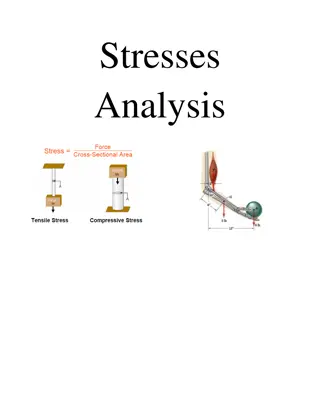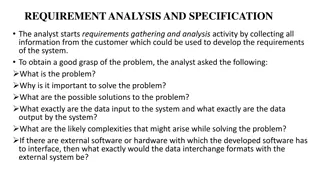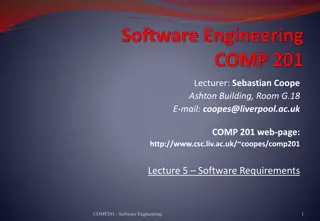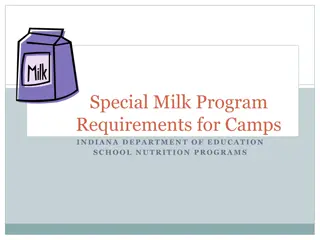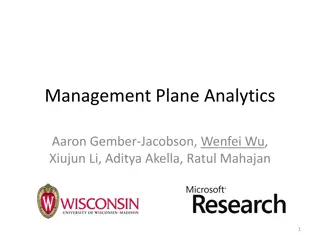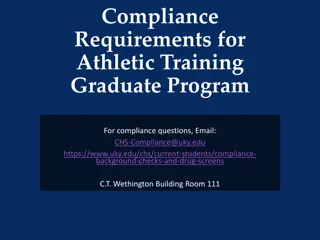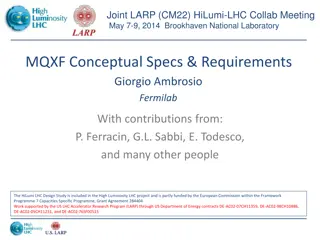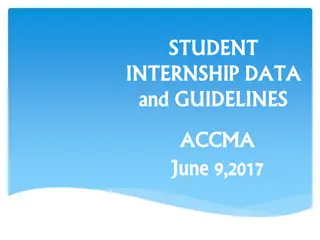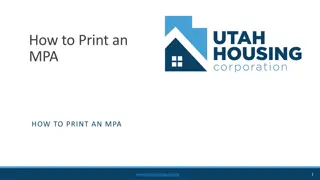MPA Program Overview and Requirements
The Master of Public Administration (MPA) program, led by Dr. Robert (Bob) Stokes, offers a comprehensive curriculum consisting of core courses, concentrations, electives, and practical experience. Students must fulfill specific credit units, core classes, concentration requirements, and public sector employment experience. The program also allows for credit transfers and emphasizes the importance of program planning, time management, and academic dedication. Guidance is provided on elective choices, internship opportunities, and scheduling strategies for successful completion of the MPA degree.
Download Presentation

Please find below an Image/Link to download the presentation.
The content on the website is provided AS IS for your information and personal use only. It may not be sold, licensed, or shared on other websites without obtaining consent from the author.If you encounter any issues during the download, it is possible that the publisher has removed the file from their server.
You are allowed to download the files provided on this website for personal or commercial use, subject to the condition that they are used lawfully. All files are the property of their respective owners.
The content on the website is provided AS IS for your information and personal use only. It may not be sold, licensed, or shared on other websites without obtaining consent from the author.
E N D
Presentation Transcript
MPA NEW STUDENT ORIENTATION Robert (Bob) Stokes, Ph.D. Department chair and MPA director
The MPA Consists of 36 Units (12, 3-unit courses) Seven core classes: PA 6110, 6030, 6620, 6630, 6640, 6800, 6550. 2 semesters of a zero-credit course, PA 6985 Professional Development Seminar a monthly Zoom webinar. A concentration is required of all students. These are Leadership; Public financial management; Nonprofit management. These require 3 concentration classes Students must also take two open elective classes. You may take non-PA courses as electives, with the Graduate Director s prior approval. If taking electives independently, one elective must be at the 6000 level. There is a zero-credit course (6980) for our comprehensive exam. For those completing the cybersecurity concentration, we require 5 concentration courses. Cybersecurity students are encouraged to take an online bootcamp class managed by the IDS Department at Jack Brown College
Public Sector Employment Requirement MPA students must have public service employment experience to complete their degree. If you have not worked in the public sector you will be required to complete an approved internship. The internship is designated as PA 6755 and is a pass/fail class. An internship does NOT count as a program elective. The Jack H. Brown College of Business and Public Administration has an Internship Office. The Internship Coordinator, Jessica Chavez, (jessicac@csusb.edu) can answer many of your questions and assist you in finding an appropriate placement https://www.csusb.edu/jhbc-student-success-center/internships.
Transferring credits With approval of MPA Director you may transfer up to three graduate courses (9 units) from other Colleges or Universities if they are relevant to the MPA program of study. To request acceptance of classes as a part of your program of study, you must submit a course description and must have received a B or better in the class. Students planning to take a class outside the Department or University during their course of study should get prior written approval. Submit the approval with your Advancement to Candidacy.
Planning your Schedule and Time Management Program Planning Students have the freedom to take as many or as few classes as they want. All core classes are typically offered every term. Concentration and elective classes are offered less frequently. You MUST plan your schedule ahead of time to avoid problems completing your degree on time. This is up to you! The plan may change over time, but it is critical that you make it. Time Management For each 3-credit class, plan to spend 3 total hours a week at reading, writing and studying. Be careful about trying to multi-task while doing your schoolwork. You will find it takes significantly more time and the result is lower quality performance. Better to find quiet, uninterrupted time to complete your course work. Your results in this program depend on the time you devote to your classes.
Advising and course sequencing The order of your classes is mostly up to you. That said, PA 6110 Public Administration Theory and Practice should be your first. This course is important as it is an intro course as well as an intensive writing class that satisfies the Writing Requirement for Graduate Candidacy. Students must pass it with at least a B- to continue in the program. It may be retaken only once. Students who cannot achieve a B- will be dismissed from the program. We recommend PA 6030 Research Methods in Administration as your second course. PA 6630 Public Budgeting and Finance should normally be taken before PA 6150, Public Financial Management *This only relates to Financial Management concentration students. PA 6550 Strategic Planning/Capstone should be your last core class. Students must pass it with at least a B in order to participate in the comp exam and graduate. After completion of all core and concentration classes you may register for PA 6980 the Comprehensive Exam. You may complete elective requirements during or after the term of your exam.
Withdrawing from Courses and Incompletes If you need to drop or withdraw from a class, it is important to do it promptly. Dropping a class can be done by you until the census date -- which is three weeks into each semester. Telling your instructor that you are dropping a class does not constitute dropping it. Your instructor cannot drop you from a class based on your request. Dropping after census date requires the instructor s, the Chair s and the Dean s approval. You will need documentation of exceptional circumstances for a late drop. Failure to get approval to drop a class after census results in an F. Retroactive withdrawal. This is possible through the Office of Graduate Studies but requires instructor and departmental approval based on truly exceptional circumstances Incompletes. These are at the discretion of the instructor when you have done over half of the work with a passing grade. These automatically change to an IC (incomplete charged), which is equivalent to an F, after one year. A completion contract must be filed stating what you must do and by what date.
Advancement to Candidacy After completing five classes (15 units) and any internship that may be required, students will submit a completed MyCAP course plan so that the chair can Advance the student to Candidacy List all the courses you still need to take before your degree can be awarded. Once each term we will hold a mandatory Advancement to Candidacy advising session to approve your MyCAP plans and review comprehensive exam requirements. Once the program plan is accepted and approved, you are officially advanced to degree candidacy.
Probation and Course Discounting Probation Failure to maintain a cumulative 3.0 grade point average during your program will result in being placed on probation. Failure to raise your cumulative GPA to a 3.0 or above at the end of your next enrolled semester may result in dismissal from the program. Students with a sub- 3.0 GPA in their first semester may be immediately dismissed from the program. You cannot graduate if your cumulative GPA for MPA coursework is below a 3.0. Repeating a Course (Discounting) Students who receive a C- or below, in any graduate class must retake the class. The lower grade is still included in the GPA unless it is discounted. A student may repeat one course taken for graduate credit and discount the earlier grade. The formal "Petition for Discount of Previous Grade" can be obtained from the Grad Studies Forms page. Two signatures of approval are required, the Graduate Program Coordinator and the Dean of Graduate Studies
Continuous enrollment and Leave of Absence Students are expected to make progress in their degree by taking classes every term (not including summer) after admission. If you know you cannot take classes for one or more terms, you must request a leave of absence (found on the Grad Studies Forms page) from the Graduate Dean. Leaves of absence cannot be longer than two years and may only be requested if a student is in good academic standing. Students who fail to take a class during the academic year and who have NOT filed a Leave of Absence are automatically dropped from the degree program and must reapply when they want to continue. The leave does not change the 7-year limit on classes applied to the degree. Submit your form through Adobe Sign in your My Coyote.
Comprehensive Exam Comprehensive Exam (PA 6980) is the final course for the MPA degree. There are three components to PA 6980 that you must complete: 1. Comprehensive Exam 2. Exit Survey 3. Career Development Activities. The Comprehensive Exam is the final requirement for the degree. The exam is offered each term during the academic year (not is summer). Students sign up for the comprehensive examinations through the Department by registering for PA 6980. The exam consists of 3 essay questions with a 4-hour time limit to complete all three. Each test is graded independently and anonymously by two readers. If they disagree, a third reader will decide. The High Pass, Pass, and Fail designations are holistic scores based on the graders overall assessment. Students failing the comprehensive examination may apply to retake it one additional time. Failure a second time means that the student will not receive the MPA degree from CSUSB.
PI Alpha Alpha Alpha Alpha is the Honor Society for Public Administration. The purpose of Pi Alpha Alpha is to encourage and recognize outstanding scholarship and accomplishment in public affairs and administration. Its objectives, such as fostering integrity, professionalism, and effective performance, promote the advancement of quality in the education and practice of the art and science of public affairs and administration. PAA membership identifies those with the highest performance levels in educational programs preparing them for public service careers. To be eligible for membership graduate students must: 1) Have completed 7 classes in the program 2) Possess a 3.7 GPA Induction ceremonies take place in the Fall and Spring. Families are invited (this is an event with a distinguished guest speaker)
Academic Integrity The University prohibits plagiarism, allows instructors to fail students in a class who plagiarize, and allows programs to dismiss students from the program of study for cheating. The University allow for faculty to use plagiarism software to check on the originality of student work. It also has software to detect cheating for online courses. The use of AI (ie. Chat GPT) is flagged by our integrity software (Turnitin) Students should try to gain an understanding of academic rules of attribution and citation ahead of starting the program. There are many websites dedicated to citation formats and style guides (such as APA)
Any questions? Robert Stokes, Ph.D. Chair and MPA Director Robert.stokes@csusb.edu
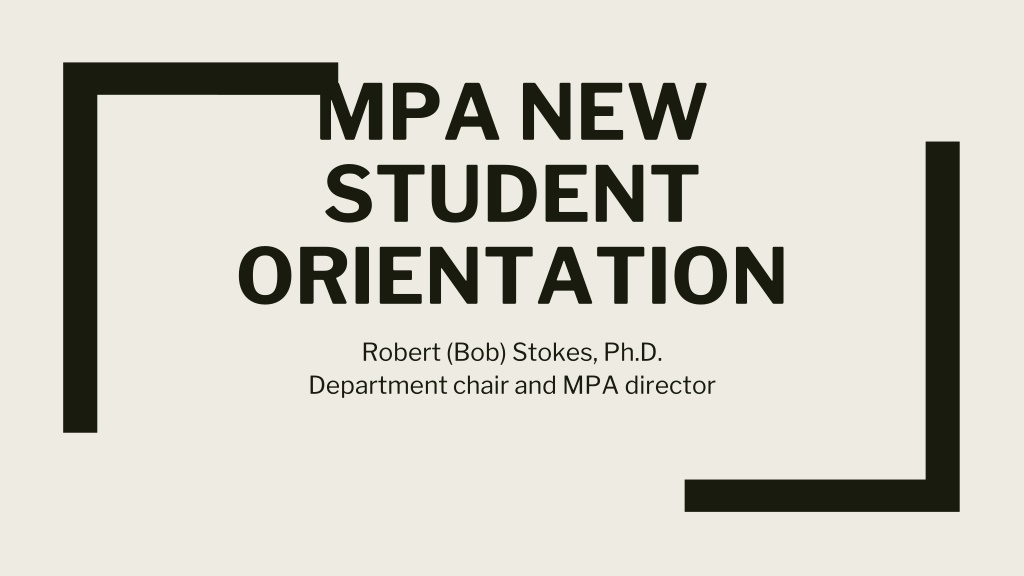
 undefined
undefined




